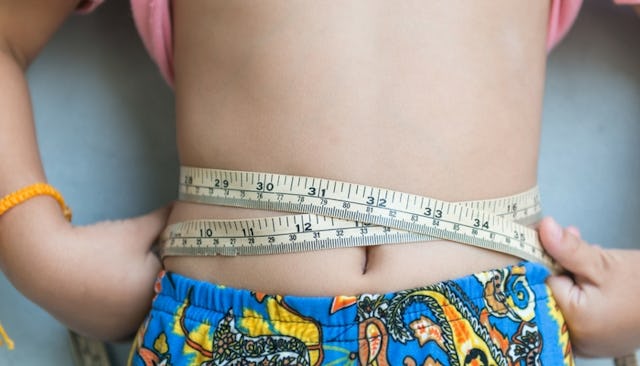The Mixed Messages We Give Girls About Their Bodies

You know, sometimes it sucks to be a female in our society.
Don’t get me wrong, I actually love being a woman. I love that stereotypically feminine combination of strength and nurturing. I love that my body made and fed three human beings. Girls ultimately represent life. It’s freaking awesome being a girl.
What’s not awesome is what society has done to girls’ bodies, or more accurately, what it’s done to our brains in relation to our bodies. I am raising two daughters, one of whom is a teen and one who will be soon. And it’s both impressive and disheartening how much time and energy I’ve spent navigating the waters of body image on their behalf. The messages we give girls about female bodies are as drastically different as our bodies themselves.
On one end, there’s the obvious magazine stand messages of unrealistic beauty — the thigh gaps, the bikini bridges, the six-pack abs, the long, lean legs, and the round, bouncy boobs. Thanks to Photoshop, we are bombarded by images of flawless skin, inhuman waistlines, and an ever-changing standard of perfection.
I remember when I was young and Kate Moss was the big supermodel. I always wanted a smaller butt, probably because all of the models I saw were narrow in the hips and tiny in the tush. Then some years ago, butt implants and Kim Kardashian’s significant derrière became a thing, and I immediately stopped paying any attention to popular culture’s body standards. I had witnessed firsthand how it was all a subconscious load of ever-changing made-up hogwash.
But my girls don’t have that full spectrum of experience yet. I’ve tried to limit their exposure to unrealistic images, but they’re everywhere. So we talk about them. We discuss what people really look like, and how even those models they’re looking at don’t really look like that in real life.
But those images aren’t the only messages they’re receiving. The most important thing is to be healthy, they’re told. Take good care of your body. Eat well. Exercise. Those messages are important and good.
But along with those messages of health comes the message that fat = unhealthy, and by extension, fat = bad. That’s everywhere too. Of course, I counter this by explaining that even healthy people often have some fat, but there are questions that even I can’t answer. How much fat is okay? How much fat is normal? How much fat is too much?
So we steer away from fat and focus on healthy eating for energy, and exercise for strength and endurance. But they’re not stupid, or blind. The vast majority of experts we look to for fitness aren’t carrying around extra junk in their trunk. And again, the fitness magazines in the checkout line at the grocery store boast headlines about exercises to get rid of your saddlebags and tummy pooches, once and for all. In the healthy body world, there may be more room for different shapes, but only if those shapes are firm and fit with no extra flab.
Then we have the “love your body as it is” movement, which is great on the one hand, but again, confusing. While it’s awesome to love yourself, “I love being overweight” isn’t exactly an empowering battle cry, and it kind of flies in the face of the “take good care of your body” message. Of course, no one should hate their body, no matter what shape or condition it is currently in. But how do you love the way your body looks and feels while also trying to change the way your body looks and feels. See? Confusing.
So I think about my girls and all of these messages they are going to face throughout their lives. They don’t currently struggle with weight or body image, but what if they do someday? And what about their friends who do? How do we teach our girls the importance of keeping their bodies healthy without exposing them to unrealistic standards or planting the seeds of subconscious judgment of themselves or others? How do we teach them that excess body fat can be an indicator of poor health while also teaching them that there’s nothing wrong with having fat? How do we teach them that being groomed and neat in their appearance matters while also teaching them that looks don’t matter?
And that’s not even getting into issues like dress codes that sexualize their shoulders and collarbones. I can’t even go there.
How about swimsuits? The bikini vs. the burkini? Personally, I think both are symbols of the objectification of women’s bodies, but at this point, what do I know? I’ve been swimming in this hole for four decades, trying to figure out what damn swimsuit will be most comfortable, flattering for my shape, not too revealing but not overly prudish, and will allow me not to have to shave every inch of my body.
Every woman I know struggles with these issues. I actually have a healthy body image — especially after having children, oddly enough — but I’d be lying if I said I never thought about what I would change if I could. Is that from my own lifetime exposure to images of “perfect” physiques? Is it even possible to for women to be 100% satisfied with their bodies? Is it possible to instill that into our daughters in the face of all of these mixed messages?
So many questions. So many messages. So many ways to screw our girls up without meaning to.
At the same time, we have so many opportunities to talk with our daughters about why these things are confusing and what we can do to find a healthy balance. It’s so important to keep asking these questions and having these conversations. Of all the messages our girls will receive about their bodies, hopefully the one they get from us will have the most impact.
[free_ebook]